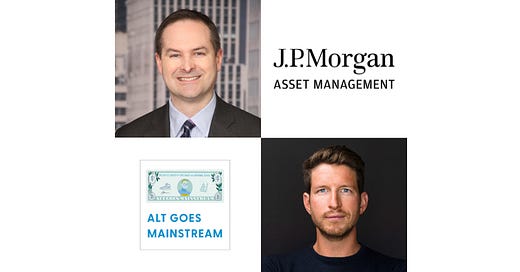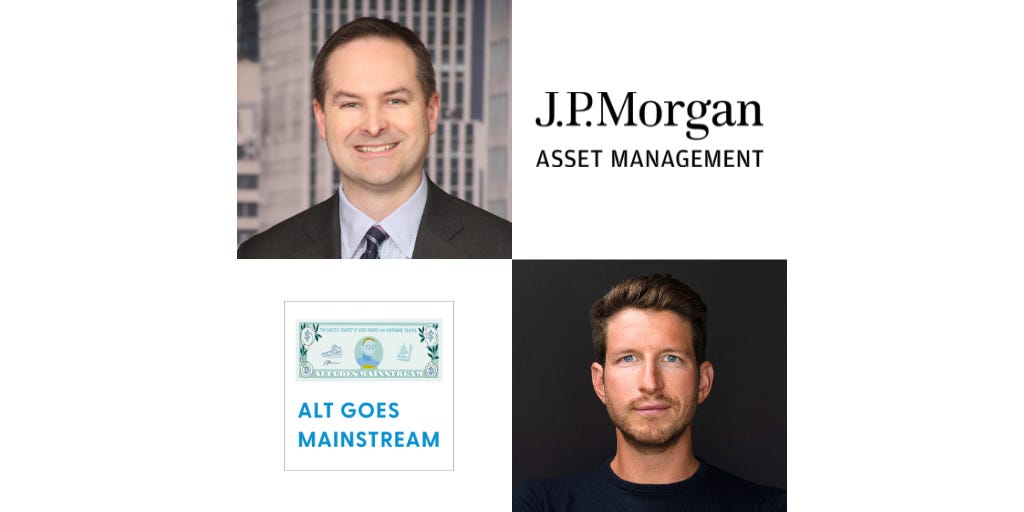Welcome back to the Alt Goes Mainstream podcast.
On today’s show, we welcome a senior member of the team at the world’s 3rd largest alternatives manager. Tyler Jayroe is a MD and Portfolio Manager in the Private Equity Group at J.P. Morgan Asset Management, which manages over $2.4 trillion of assets on behalf of a diverse group of global institutions and individual investors. Tyler’s team, the Private Equity Group, has a 40 year history of investing across private markets, covering the alternative investment spectrum and investing over $42B of capital. Tyler helps spearhead a team that invests into funds, co-investments, and secondaries across private equity, growth equity, and venture fund strategies.
Tyler and I had a fascinating conversation about how an industry behemoth allocates capital across funds and strategies. We discussed:
What they look for when investing into funds.
Why middle market private equity is an area they have focused on.
The opportunity for secondaries in the current market.
The differences between a first-time investor and a first-time fund manager.
What a scalable and replicable process really means when it comes to evaluating fund managers.
Thanks Tyler for coming on the podcast to share your deep experience in private markets. Hope you enjoy.
Contact JPMorgan Distribution Services, Inc. at 1-800-480-4111 for a fund prospectus. You can also visit us at www.jpmorganfunds.com. Investors should carefully consider the investment objectives and risks as well as charges and expenses of the mutual fund before investing. The prospectus contains this and other information about the mutual fund. Read the prospectus carefully before investing.
This document is a general communication being provided for informational purposes only. It is educational in nature and not designed to be a recommendation for any specific investment product, strategy, plan feature or other purpose. Any examples used are generic, hypothetical and for illustration purposes only. Prior to making any investment or financial decisions, an investor should seek individualized advice from personal financial, legal, tax and other professionals that take into account all of the particular facts and circumstances of an investor’s own situation.
Risk Summary
The following considerations, which summarize some, but not all, of the risks of an investment in the representative strategy, should be carefully evaluated.
General Investment Risks
There is no assurance that the investments held by the Fund will be profitable, that there will be proceeds from such investments available for distribution to Shareholders or that the Fund will achieve its investment objective. An investment in the Fund is speculative and involves a high degree of risk. Fund performance may be volatile and a Shareholder could incur a total or substantial loss of its investment. There can be no assurance that projected or targeted returns for the Fund will be achieved.
Financial Market Developments
Volatile conditions in the capital markets may cause limitations on the ability of companies in which the Portfolio Funds will invest to obtain capital, or subject such companies to higher costs of capital for financing. This lack of available credit could impede upon the ability of such companies to complete investments and higher costs of capital could reduce the returns of the Fund or Portfolio Funds. Changes in interest rates may adversely affect the investments held by the Fund. Changes in the general level of interest rates can affect the value of the Fund’s investments. Interest rates are highly sensitive to many factors, including governmental, monetary and tax policies, domestic and international economic and political considerations, fiscal deficits, trade surpluses or deficits, regulatory requirements and other factors beyond the control of the Fund and the companies in which the Portfolio Funds invest. Although it is expected that the Fund’s borrowings, if any, will be short-term in nature, the companies in which the Portfolio Funds invest may finance a significant portion of their activities with both fixed and floating rate debt. By financing the acquisition and development of an investment with floating rate debt, such companies and Portfolio Funds, and indirectly the Fund, will bear the risk that in the event of rising interest rates and a lack of concomitant growth in income, or any increase in underwriting standards that might limit the availability of credit, it could become difficult for such companies and Portfolio Funds to obtain refinancing. In such a case, a company or Portfolio Funds could be forced to take actions that might be disadvantageous at the time in question, such as refinancing on unfavorable terms or selling an asset. Any rise in interest rates may also significantly increase the interest expense of the companies in which the Fund and Portfolio Funds invest, causing losses and/or the inability to service debt levels. If a company in which a Portfolio Funds invests cannot generate adequate cash flow to meet debt obligations, the Fund may suffer a partial or total loss of capital invested in the Portfolio Funds. Given current market conditions following a historically low interest rate environment, risks associated with rising interest rates are heightened.
Closed-End Fund Structure; Liquidity Limited to Periodic Repurchases of Shares
The Fund is designed primarily for long-term investors. An investment in the Fund, unlike an investment in a traditional listed closed-end fund, should be considered illiquid. The Shares are appropriate only for investors who are comfortable with investment in less liquid or illiquid portfolio investments within an illiquid fund. An investment in the Shares is not suitable for investors who need access to the money they invest. Unlike open-end funds (commonly known as mutual funds), which generally permit redemptions on a daily basis, the Shares will not be redeemable at a Shareholder’s option. Unlike stocks of listed closed-end funds, the Shares are not listed, and are not expected to be listed, for trading on any securities exchange, and the Fund does not expect any secondary market to develop for the Shares in the foreseeable future. The Fund’s private market investments will be illiquid and typically cannot be transferred or redeemed for a substantial period of time. The Shares are designed for long-term investors, and the Fund should not be treated as a trading vehicle.
Repurchase of Shares Risk
Although the Board may, in its sole discretion, cause the Fund to offer to repurchase outstanding Shares at their net asset value and the Adviser intends to recommend that, in normal market circumstances, the Board conducts quarterly repurchase offers of no more than 5% of the Fund’s net assets. Shares are considerably less liquid than shares of funds that trade on a stock exchange or shares of open-end registered investment companies. It is possible that the Fund may be unable to repurchase all of the Shares that a Shareholder tenders due to the illiquidity of the Fund investments or if the Shareholders request the Fund to repurchase more Shares than the Fund is then offering to repurchase. In addition, substantial requests for the Fund to repurchase Shares could require the Fund to liquidate certain of its investments more rapidly than otherwise desirable in order to raise cash to fund the repurchases and achieve a market position appropriately reflecting a smaller asset base. This could have a material adverse effect on the value of the Shares.
Risks of Private Equity Strategies
The Fund’s investment portfolio will include exposure to private companies for which operating results in a specified period will be difficult to predict. Such investments involve a high degree of business and financial risk that can result in substantial losses.
Private Equity Investment Risks. Private equity transactions may result in new enterprises that are subject to extreme volatility, require time for maturity and may require additional capital. In addition, they frequently rely on borrowing significant amounts of capital, which can increase profit potential but at the same time increase the risk of loss. Leveraged companies may be subject to restrictive financial and operating covenants. The leverage may impair the ability of these companies to finance their future operations and capital needs. Also, their flexibility to respond to changing business and economic conditions and to business opportunities may be limited. A leveraged company’s income and net assets will tend to increase or decrease at a greater rate than if borrowed money was not used. Although these investments may offer the opportunity for significant gains, such buyout and growth investments involve a high degree of business and financial risk that can result in substantial losses, which risks generally are greater than the risks of investing in public companies that may not be as leveraged.
Venture Capital Risks. Venture capital investments are in private companies that have limited operating history, are attempting to develop or commercialize unproven technologies or to implement novel business plans or are not otherwise developed sufficiently to be self-sustaining financially or to become public. Although these investments may offer the opportunity for significant gains, such investments involve a high degree of business and financial risk that can result in substantial losses, which risks generally are greater than the risks of investing in public or private companies that may be at a later stage of development.
Risks Associated with Private Company Investments
Private companies are generally not subject to SEC reporting requirements, are not required to maintain their accounting records in accordance with generally accepted accounting principles, and are not required to maintain effective internal controls over financial reporting. As a result, the Adviser may not have timely or accurate information about the business, financial condition and results of operations of the private companies in which the Fund invests. There is risk that the Fund may invest on the basis of incomplete or inaccurate information, which may adversely affect the Fund’s investment performance. Private companies in which the Fund may invest have limited financial resources, shorter operating histories, more asset concentration risk, narrower product lines and smaller market shares than larger businesses, which tend to render such private companies more vulnerable to competitors’ actions and market conditions, as well as general economic downturns. These companies generally have less predictable operating results, may from time to time be parties to litigation, may be engaged in rapidly changing businesses with products subject to a substantial risk of obsolescence, and may require substantial additional capital to support their operations, finance expansion or maintain their competitive position. These companies may have difficulty accessing the capital markets to meet future capital needs, which may limit their ability to grow or to repay their outstanding indebtedness upon maturity.
Typically, investments in private companies are in restricted securities that are not traded in public markets and subject to substantial holding periods, so that the Fund may not be able to resell some of its holdings for extended periods, which may be several years. There can be no assurance that the Fund will be able to realize the value of private company investments in a timely manner.
JPMorgan Private Markets Fund is distributed by J.P. Morgan Institutional Investments Inc., which is an affiliate of JPMorgan Chase & Co. Affiliates of JPMorgan Chase & Co. receive fees for providing various services to the funds. J.P. Morgan Institutional Investments, Inc. is a member of FINRA.
If you are a person with a disability and need additional support in viewing the material, please call us at 1-800-343-1113 for assistance.
J.P. Morgan Asset Management is the brand name for the asset management business of JPMorgan Chase & Co. and its affiliates worldwide.
©JPMorgan Chase & Co.
















Share this post